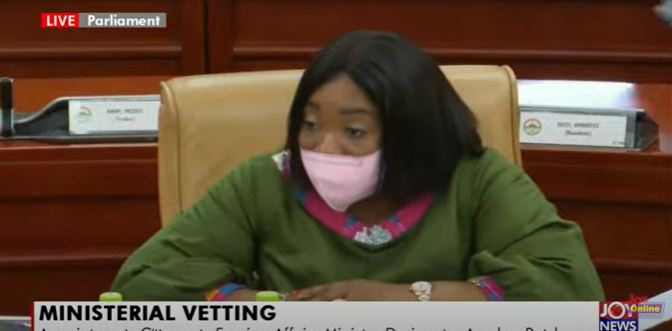
[ad_1]
Foreign Minister-designate Shirley Ayorkor Botchwey says she still does not know if the closure of the bank accounts of the Ghanaian Embassy in Brussels is in any way linked to the blacklisting by the European Union.
“The decision of the ING bank to close the accounts that our embassy in Brussels holds with them was a decision that surprised us”, she declared during her examination by the Parliament’s appointments committee.
In October 2020, ING bank notified the Ghanaian Embassy in Brussels of its decision to end all business relations it had with the Embassy.
It based its action on article 59 of the general regulations of the bank which stipulates:
“Without prejudice to the provisions provided for by specific agreements or regulations, in particular the Supplementary Regulations for Payment Transactions, for the Transactions and services covered by these Regulations, both the Client and ING may – without being required to justify their decision – terminate all or part of the commercial relationship they have entered into, subject, where applicable and at the request of the other party, to compensation for any damage suffered as a result of the latter, which the other party must to justify. The party wishing to terminate its business relationship notifies the other party of its decision in writing… ”
He informed the embassy to transfer all of his funds from the bank to another bank by November 12, 2020.
According to Shirley Ayorkor Botchwey, the embassy bank accounts were not being used for anything untoward that merited such harsh action from ING bank.
She said after personal checks of various bank statements, he revealed that the accounts had been used for official purposes only.
“Embassy accounts, usually apart from compensation and goods and services receipts, and in cases where they have accounts that receive visa and passport fees, nothing else goes through those accounts. So that surprised us.
“At one point, we even wanted a joint mission from Parliament and my ministry to go to Brussels to find out. Unfortunately, due to Covid, we were unable to embark on this mission.
“But the bank came back to us to tell us that it is the right of a bank to disengage from a customer and that it has no responsibility to any customer to explain the reasons.
“To satisfy me because the mission could not get to Brussels, I asked for bank statements for all the accounts managed by the mission three years ago and we have carefully carried out each transaction and there is absolutely nothing annoying.
She noted, however, that other embassies that suffered the same fate with their bankers have also been blacklisted by the EU.
Ghana has been placed on the European Union’s blacklist for failing to comply with money laundering and terrorist financing regulations, which places an additional burden on banks that process transactions from these countries. country.
Banks are required to exercise increased due diligence on and report transactions from blacklisted countries like Ghana, resulting in additional costs for banks, the minister said.
She said, however, that with regard to the blacklist, Ghana has made progress in meeting EU demands and will therefore present in February a report on the progress the country has made in verifying financial malfeasance and will ask to be removed from the blacklist.
Source link